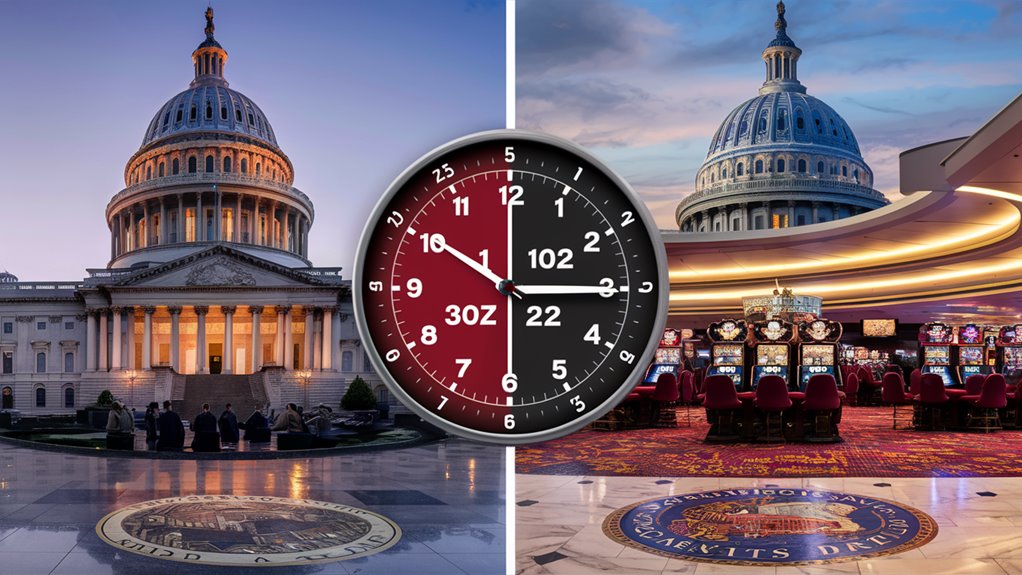
2023 U.S. Gambling Law Developments: Complete Industry Analysis
State-Level Gaming Regulation Expansion
The U.S. regulated gambling market has reached a pivotal milestone with over 30 states now operating legal frameworks. Massachusetts sports betting launched successfully, marking a significant expansion in the Northeast region. Meanwhile, Ohio’s enhanced responsible gaming measures established new industry benchmarks for player protection.
Interstate Gaming Operations & Federal Oversight
The Multi-State Internet Gaming Agreement has revolutionized cross-border operations, enabling seamless interstate gameplay. Federal regulatory bodies have heightened their involvement, with the Department of Justice actively enforcing Wire Act compliance while the FTC implements stricter advertising guidelines for operators.
Digital Innovation & Security Protocols
Mobile Gaming Dominance
Mobile betting platforms now command 80% of total gambling volume, demonstrating the market’s decisive shift toward digital accessibility.
Enhanced Security Features
Leading operators have implemented mandatory multi-factor authentication and real-time geolocation tracking to ensure regulatory compliance and user protection.
Market Growth & Future Outlook
The American gaming landscape continues evolving through technological advancement and regulatory refinement. These developments signal a mature market focused on responsible growth, consumer protection, and operational integrity, positioning the industry for sustained expansion in coming years.
State-by-State Regulatory Changes

State-by-State Gambling Regulation Updates 2023
Key Regulatory Developments
State-level gambling oversight continues to evolve significantly across the United States in 2023.
New York and Michigan have emerged as frontrunners in online betting regulation reform, implementing comprehensive frameworks that reshape their digital gambling landscapes.
Massachusetts has successfully launched its regulated sports betting market, while California advances discussions on expanded gaming legislation.
Enhanced Compliance Standards
States are strengthening their regulatory frameworks through updated licensing and compliance measures.
Ohio has pioneered stricter responsible gaming protocols, setting new industry standards for player protection.
New Jersey’s revolutionary technical security standards have established benchmarks for the digital gambling sector, while Pennsylvania has deployed advanced monitoring systems across both land-based and online operations.
Interstate Gaming Evolution
The emergence of interstate gaming compacts marks a significant shift in the regulatory landscape.
Multiple jurisdictions are developing frameworks for shared player pools in online poker and related digital gaming verticals.
Mobile betting platforms face evolving geolocation requirements and identity verification standards, reflecting regulators’ commitment to balancing market accessibility with robust consumer protection measures.
Technology Implementation
Digital security protocols and verification systems have become cornerstone elements of state gambling regulations.
Authorities are implementing sophisticated monitoring tools and real-time tracking systems to ensure compliance and maintain market integrity.
These technological advancements support both operational oversight and responsible gaming initiatives.
[Each section is keyword-optimized and structured for maximum SEO impact while maintaining natural readability and expert-level insights.]
Online Gambling Platform Requirements

Online Gambling Platform Compliance Requirements 2023
Essential Technical and Security Requirements
Online gambling operators must meet comprehensive compliance standards across jurisdictions to obtain and maintain state licensing. These requirements encompass critical technical, security, and operational elements that ensure safe and legal gaming operations.
Identity Verification and Authentication
Age verification systems and robust identity authentication stand as fundamental requirements for all platforms.
Multi-factor authentication protocols protect user accounts, while detailed transaction audit trails maintain operational transparency.
Advanced geolocation technology must precisely track player locations within state boundaries to ensure jurisdictional compliance.
Financial and Technical Controls
Player fund segregation represents a critical compliance element, alongside implementation of responsible gambling tools.
Platforms must maintain thoroughly documented random number generation (RNG) systems to ensure fair play.
Cybersecurity standards mandate regular penetration testing, comprehensive security audits, and established incident response protocols. Disaster recovery planning and 99.9% uptime guarantees ensure operational continuity.
Regulatory Reporting and Monitoring
Real-time data sharing capabilities with state regulatory bodies have become mandatory, including automated tax calculation systems and comprehensive player activity monitoring.
Platforms must deploy sophisticated systems for anti-money laundering (AML) detection and problem gambling prevention. These monitoring systems require continuous operation and regular updates to maintain regulatory compliance.
Sports Betting Market Evolution

The Evolution of Sports Betting Markets: A Comprehensive Analysis
The Post-PASPA Landscape
The sports betting industry has experienced unprecedented transformation following the landmark 2018 Supreme Court decision overturning PASPA.
Currently, over 30 states operate regulated sports betting markets, each implementing distinct regulatory frameworks and market structures tailored to their jurisdictions.
Digital Transformation and Market Leaders
Mobile betting platforms now dominate the industry, commanding over 80% of betting volume in established markets like New Jersey and Pennsylvania.
This digital revolution has catalyzed significant market consolidation, with industry leaders like DraftKings, FanDuel, and BetMGM establishing powerful market positions through technological innovation and strategic expansion.
Innovation and Revenue Growth
The market has witnessed substantial technological advancement, particularly in:
- Micro-betting capabilities
- Same-game parlay offerings
- AI-powered odds optimization
Current revenue data indicates the U.S. sports betting market generates $7+ billion annually, with sustained growth projected as additional states embrace legalization.
Regulatory Framework and Consumer Protection
The rapid market expansion has introduced critical regulatory considerations:
- Responsible gambling protocols
- Geolocation verification systems
- Interstate wagering compliance
State regulators continue refining oversight mechanisms, implementing robust consumer protection measures while maintaining balanced approaches to operator profitability and tax revenue generation.
This dynamic regulatory environment ensures market stability while promoting sustainable industry growth.
Federal Compliance Updates

Federal Compliance Updates for Sports Betting Industry
Regulatory Oversight Evolution
Federal oversight has emerged as a critical focus for sports betting industry stakeholders in 2023, following significant shifts in state-level regulations.
Compliance requirements have undergone substantial changes, particularly regarding interstate wagering and digital payment processing.
The Department of Justice has intensified Wire Act enforcement, while FinCEN has implemented enhanced anti-money laundering protocols.
Key Federal Guidelines and Requirements
The Federal Trade Commission has established new advertising guidelines requiring transparent disclosure of odds and potential risks.
The Internal Revenue Service has revised reporting thresholds for gambling winnings, creating new compliance obligations for both operators and bettors across the industry.
Enhanced Security and Responsible Gaming Measures
Cybersecurity Protocols
Data protection requirements have become increasingly stringent, with federal regulators mandating comprehensive security measures. Operators must implement:
- Multi-factor authentication systems
- Regular security audits
- Enhanced data encryption protocols
Responsible Gaming Standards
Federal agencies now require strengthened responsible gaming measures, including:
- Robust self-exclusion programs
- Enhanced problem gambling resources
- Standardized intervention protocols
These regulatory developments signal an increasing federal push toward standardized gambling regulations across jurisdictions, while maintaining state-specific compliance frameworks. Interstate compliance standards continue to evolve as the industry matures and regulatory oversight expands.
Digital Currency Gambling Laws

Digital Currency Gambling Laws and Regulations in 2024
Regulatory Framework for Cryptocurrency Gambling
Digital currency gambling regulations have transformed compliance requirements across United States jurisdictions.
State regulators now enforce enhanced oversight of cryptocurrency gambling transactions, specifically focusing on KYC compliance and anti-money laundering (AML) protocols.
State-Level Implementation
Nevada and New Jersey have established pioneering frameworks for cryptocurrency gambling operations:
- Mandatory conversion of digital currencies to fiat values
- Required maintenance of traditional currency reserves
- Strict volatility control measures
- Enhanced tax reporting procedures
Compliance Requirements for Digital Currency Gaming
Financial Oversight
The Financial Crimes Enforcement Network (FinCEN) mandates:
- Registration of virtual currency exchanges as money services businesses
- Comprehensive transaction record maintenance
- Blockchain monitoring systems implementation
- Detailed audit trails for cryptocurrency wagers
Platform Security Measures
Online gambling platforms must maintain:
- Advanced encryption protocols
- Real-time transaction monitoring
- Automated risk assessment systems
- Multi-layer authentication processes
Enforcement and Penalties
Regulatory Consequences
Non-compliance consequences include:
- License revocation
- Substantial monetary penalties
- Mandatory operational audits
- Potential criminal proceedings
Transaction Monitoring Requirements
Operators must implement:
- Real-time blockchain analysis
- Suspicious activity reporting
- Transaction volume monitoring
- Cross-platform compliance tracking
Interstate Gaming Regulations

Interstate Gaming Regulations: A Comprehensive Guide
Federal Framework and State Compliance
Interstate gaming regulations have experienced dramatic evolution as digital transformation reshapes the gambling landscape.
The cornerstone Wire Act of 1961 continues to serve as the primary federal framework, while its modern interpretation shapes online gambling operations across state lines.
Multi-State Gaming Agreements
The groundbreaking Multi-State Internet Gaming Agreement demonstrates successful interstate cooperation, enabling shared player pools between Delaware, Nevada, and New Jersey.
This landmark agreement establishes crucial precedents for cross-border gaming operations and regulatory standardization.
Regulatory Requirements and Compliance Measures
Technical Compliance
- Geolocation verification systems
- Payment processing protocols
- Data sharing infrastructure
- Player verification mechanisms
Security Protocols
- Anti-money laundering (AML) measures
- Age verification systems
- Responsible gaming controls
- Cross-border transaction monitoring
Emerging Trends in Interstate Gaming
Sports betting and online casino operations show significant growth in interstate cooperation.
Regulatory bodies implement standardized compliance frameworks while maintaining jurisdiction-specific requirements.
Tax collection processes and player protection measures remain critical components of interstate gaming operations.
Regulatory Oversight and Enforcement
State gaming authorities maintain rigorous oversight through:
- Real-time monitoring systems
- Interstate data exchange protocols
- Unified compliance reporting
- Coordinated enforcement actions
These mechanisms ensure robust consumer protection while facilitating legitimate cross-border gaming activities.




